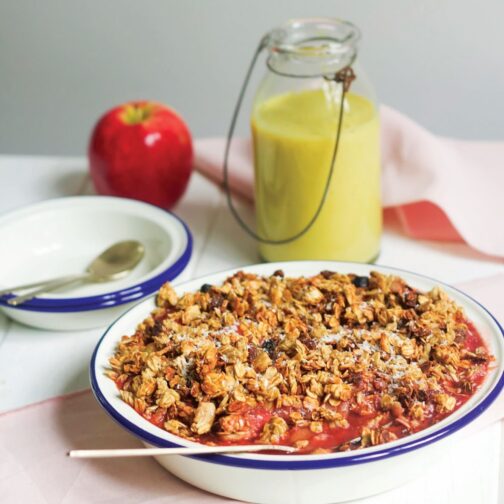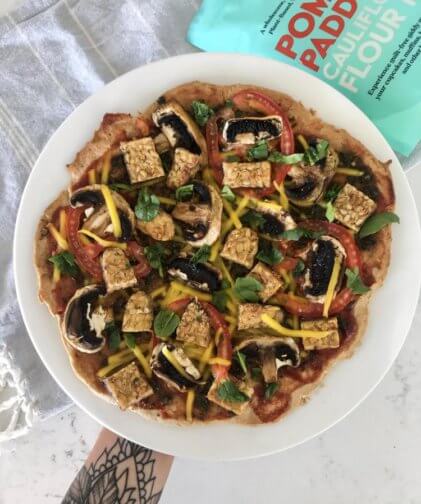
Is there a place for packaged products in a healthy plant-based diet? Vegan sports nutritionist Caitlin Adler weighs in.
While a lot of people choose to go vegan for ethical reasons, there is a cohort of plant-based dieters who choose to embrace the lifestyle for the health benefits that it can provide. There’s good reason for this. Plant-based diets can improve dietary quality and are associated with reduced mortality, particularly from cardiovascular disease and cancer, and may be especially beneficial for those with obesity, type 2 diabetes, high blood pressure, lipid disorders, or heart disease.
There is also a strong movement within veganism that focuses on a wholefoods approach. This focuses on making plants the majority of your diet and avoiding processed foods. It excludes refined foods like added sugars, white flour, processed grains, and oils.
That sounds good in theory, right? But there’s actually more than meets the eye when you label all processed foods as unhealthy or bad.
Nutritional nuance
When you look at processed foods, these exist on a spectrum. There’s a difference between processed foods like tofu, nut butters, canned or refried beans, soy yoghurt, plant milks, and fortified plant-based meats, compared to ultra-processed foods that aren’t nutritionally dense, and contain high levels of added sodium, saturated fat, and sugar.
To place all processed foods in the same camp misses the nuances between their dietary quality, macronutrient and micronutrient makeup, and how they can fit into a healthy diet.
When you look at processed foods, these exist on a spectrum.
What’s more, even with these nuances in mind, I generally don’t recommend completely ruling out ultra-processed foods either. It’s worth considering the context when that food is consumed, in particular, the following questions:
- Purpose: What’s the goal of the food or meal? Is it a social event or is it to help fuel you for the day?
- Amount: What is the size / portion of the food?
- Frequency: How often does it appear in your diet? What does the rest of your eating look like day-to-day or week-to-week?
Putting it into practice
Let’s look at three examples where eating processed foods would be beneficial.
Fuelling performance
An athlete with high energy requirements in need of some quick carbohydrates 30 mins before training is better off eating a handful of lollies, which are low in fibre and provide fast amounts of energy, than the equivalent energy in fruit and oats, which would take longer to digest, absorb and could cause GI distress that interferes with performance.
Meeting nutritional needs
A vegan individual in a fat-loss phase with a limited calorie ‘budget’, is better off trying to meet their protein needs efficiently with an extra protein shake or consuming a fortified plant-based meat, than trying to do so with less efficient proteins like legumes or nuts which have a higher calorie-to-protein ratio.
Enjoyment and balance
Someone who is looking to eat a delicious dessert to complement their balanced diet throughout the day can and should absolutely feel free to eat some chocolate, ice cream or a treat of their choice in moderation.

It comes down to context
When including processed foods, it comes down to context: the purpose, amount, and frequency. Processed and refined foods all have a time and place in nutrition and general health depending on what they need to achieve.
When including processed foods, it comes down to context: the purpose, amount, and frequency.
It’s also worth noting that dichotomous rules that label some foods as ‘good’ and others as ‘bad’ are a predictor of disordered eating habits. In particular, an obsession with ‘clean’, ‘proper’ or healthful eating can be to the point that someone could damage their own wellbeing. So, while eating an abundance of whole plant foods has wonderful benefits, careful attention should be paid to the intentions behind restrictive wholefood diets and attitudes around processed foods.
Processed foods often get demonised in clean eating circles, vegan and otherwise, but putting them all in the ‘bad’ basket is reductive of their wider context. There are situations for many people where including moderately or even highly processed foods can be beneficial, not to mention helping normalise someone’s relationship with food.
***
Learn more about Caitlin in our interview feature here.
Lead image: Caitlin Adler / photo by Vanessa Nataoli





















